Diversity
Yesterday was Jackie Robinson Day in major league baseball. Every player on every team wore the number 42 on their uniform in honor of his integrating baseball in 1947. In the 1950s and 60s, players such as Willie Mays, Hank Aaron, Bob Gibson, Ernie Banks, Frank Robinson, and many more followed. All were giants of baseball. All are in the Hall of Fame. All are African American.
This morning, USA Today released research results showing that the percentage of African Americans in baseball is now down to 8 percent, the lowest since Robinson’s day. In 1975, it reached 27 percent; in 1995, it was 19 percent. There are a variety of reasons for the decline: basketball and football appear more glamorous to top athletes, the cost of equipment in baseball is prohibitive for many inner city schools and teams, and there is a lack of college scholarships in baseball. Some also cite the low number of African Americans in leadership positions – out of 30 teams, there are only 2 general managers and 2 managers.
Whatever the reason, baseball is poorer for the absence.
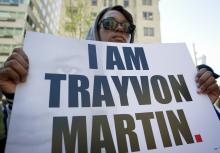
Today I search my soul along with many Americans who are discussing the Trayvon Martin tragedy. These conversations can range from news blogs clamoring for justice to benign disputes about the facts of the case by office water coolers. One of the more challenging conversation threads recently came in the form of a status update on Facebook. My colleague, Efrem Smith, lamented:
"Shouldn't the young black males who are victims of black on black crime get the same attention as Trayvon Martin? I say yes."
I believe Efrem's statement could have us conversing for months to come should we be bold enough to lovingly engage.
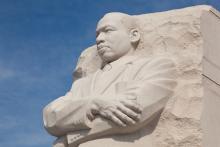
When my grandmother died when I was 15, I wanted the world to stop. I remember looking at traffic on the road near my home and just wanting everyone to be still — to stop and ponder what we all had lost in losing my grandmother and her love.
That adolescent desire is exponentially greater this week juxtaposed with the 44th anniversary of the martyrdom of the Rev. Dr. Martin Luther King, Jr., Maundy Thursday, Good Friday, and the continuing lack of criminal charges against the man who shot and killed Trayvon Martin in Florida last month.
So I grieve — and I’m not sure what to do with the grief.
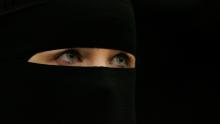
Jean Younis won’t be wearing an Easter bonnet at church this Sunday. Instead, the office manager at Bonita Baptist Church in San Diego will don an Islamic headscarf to support the family and friends of Shaima Alawadi, the Iraqi immigrant and mother of five who died March 24, three days after being beaten in her home in El Cajon, Calif.
“I do expect a reaction, but that’s the point. It needs to be discussed,” said Younis, 59, who predicted that most church members would be supportive or respectfully inquisitive.
She is one of many non-Muslim women to post photos of themselves wearing a headscarf on “One Million Hijabs for Shaima Alawadi,” a recently created Facebook Page that had nearly 10,000 likes on Monday (April 2) and hundreds of photos. Others posting on the page have identified themselves as Catholics, Quakers, Mennonites, Jews, Pagans, and atheists.

An umbrella group of Christian denominations committed to combating racism is urging churches to use the death of Florida teen Trayvon Martin as a "teachable moment" to speak out against racial stereotypes.
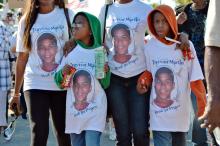
I don't want to say too much. I don't want to over-explain. I know that leaves lots of room for misinterpretation. I just want to ask you to wrestle with a few questions.
I was asked last week what my greatest fear as a father of a black boy is in light of the Trayvon Martin murder. My greatest fear for my children is the cautious regret I see on the many faces that can’t help but leave open the possibility there may be some justification for this tragedy. Rest assured George Zimmerman and his supporters will exploit this deep-seated immutable suspicion, just like Susan Smith did so many years ago.
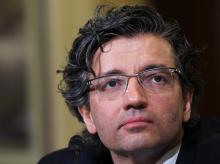
One of two new members of the U.S. Commission on International Religious Freedom has Muslim civil rights groups crying foul.
Zuhdi Jasser, who lauded a controversial New York City police surveillance program that targeted Muslims and helped lead the opposition to an Islamic cultural center near Ground Zero, has been appointed to the commission, which advises the president, Congress and State Department on religious rights abuses internationally.
"It would have been better to appoint someone who has some measure of credibility with Muslim Americans," said Ibrahim Hooper, spokesman for the Council on American-Islamic Relations.
"He has long been viewed by American Muslims and the colleagues in the civil liberties community as a mere sock puppet for Islam haters and an enabler of Islamophobia."
When I left the Sojourners office Monday evening in the formerly blighted, now Disney-fied, Columbia Heights neighborhood of Washington, D.C., I walked a half-block and joined a multiethnic, multigenerational crowd that had gathered in front of the luxury Park Triangle apartments. In the middle of an open square shared by the entire Columbia Heights community, nearly 100 people stood in a circle braving the decidedly un-springlike arctic chill.
We listened intently as an ordinary D.C. resident stood in the middle of the circle with a bullhorn and shared from the heart. “Forgive us," the unnamed gentleman pleaded. "George Zimmerman was Latino. The horrible atrocity that has rocked our nation was committed by a Latino man. I am Latino. I ask for your forgiveness on behalf of my community.”
Then he went on to explain how there have been long-standing tensions between African-Americans and Latinos and that we must begin to deal with them.
“Forgive us,” he pleaded again.
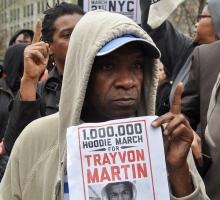
Seldom does anyone accuses Geraldo Rivera of being a reporter. More often than not, he’s good for audacious soundbytes and a campy mug at the camera while sporting his trademark “look at me” mustache. He’s more circus performer than analyst, but in as much, he’s a sign (or symptom) of the state of “news” in today’s media.
Opinion journalism is one thing. I do it all the time. There’s a time and place for opinion. But there’s an important distinction between expressing genuine, informed opinions and lodging verbal salvos into the media fray sure to garner one some much-coveted attention in the next 24-hour news cycle.
Geraldo’s most recent stunt had to do with the case of Trayvon Martin. Most folks are familiar with the story in which neighborhood watch captain George Zimmerman shot teenager Trayvon Martin, who was unarmed, and that Zimmerman remains a free man because he claimed self-defense. I’ll forgo rehashing the details, as you can find them elsewhere, but there’s much discussion about what’s to blame for the boy’s death.
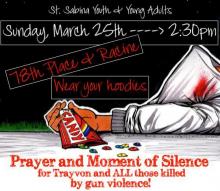
Christians and other people of good faith nationwide stood in solidarity with Trayvon Martin this weekend by wearing hooded sweartshirts — aka "hoodies"— to church.
Monday marks the one-month anniversary of Trayvon's slaying in Sanford, Florida at the hands of neighborhood "watchman" Gregory Zimmerman, who shot and killed the 17-year-old African-American boy in “self defense” for “looking suspicious” while dressed in a hooded sweatshirt.
Trayvon was unarmed, carrying only a package of Skittles, an iced tea and his cell phone.
Last week, people across the nation began wearing hoodies to work, school, and community marches in response to Trayvon's slaying and the injustice of the kind of racial profiling that it would appear directly led to it. On Sunday, many churches took that vision a step further as pastors and congregants donned hoodies and wore them to church for what some congregations called "Hoodie Sunday."
On Saturday, doctors took Shaima Alawadi, 32, an Iraqi mother of five, off life support, three days after her 17-year-old daughter, Fatima Al Himidi, found her brutally beaten and unconscious in the dining room of the family’s home in El Cajon, Calif. She died a short while later at 3 p.m.
Fatima told reporters that her mother’s head had been repeatedly smashed in with a tire iron — a metal rod used to pry the rubber tube from a bike tire. Next to Alawadi’s barely breathing body was a note: “Go back to your country, you terrorist."

A pair of scissors transported across state lines has emerged as a controversial element in Ohio's first case under a landmark 2009 federal law that expanded government powers to prosecute hate crimes.
The case involves a dozen members of an Amish sect in central Ohio who are charged with using the shears -- made in New York and brought to Ohio -- to forcibly cut the hair and beards of fellow Amish to avenge a religious dispute.
The travel history of the shears may seem like a peculiar point in the peculiar case that has focused national attention on Ohio's Amish community. But the hate crimes law -- like many other federal statutes, including health-care reform legislation -- is rooted in Congress' far-reaching power to regulate interstate commerce.
Enacted in 2009, the Matthew Shepard and James Byrd Jr. Hate Crimes Prevention Act was named for a gay University of Wyoming student who was beaten and tortured to death by two men in 1998, and a black man who was chained to a pickup truck and dragged to death in Texas that same year.

It’s about to rain. A rolling explosion of thunder just shook the ground my home rests on. Flashes light the sky and moments later … thunder rolls. That’s how it feels when I think of the last moments of 17-year-old Trayvon Martin’s life and the fact that the Sanford Police Department determined after a nearly non-investigation that Trayvon’s killer, 28-year-old George Zimmerman, did no wrong—nothing wrong.
Like the thunder rattling my apartment, the death of Trayvon Miller is rattling my soul. Like millions of Americans, I marveled over the fact that I had heard nothing on the news about the slaying in the three weeks since the incident took place. Then, when the Sanford Police released the 911 tapes over the weekend, and the nation heard Trayvon’s horrified cries for help before the single shot that ended his life, the story exploded—like my own heart.
Something broke in me. I actually sat paralyzed in front of my television—shocked. Then thunder cracked open my soul and I wailed. I mean I keened … and I couldn’t stop.
Trayvon looked like several of my nephews. He could have been any of them. He was just living his life on February 26—walking home from the convenience store before the big game, talking on his cellphonewith his friend. That’s all.
Then in the last moments of his life, he was chased, cornered, beaten and shot by a white man he didn’t know for reasons never explained to him—except the accusation from his assailant that he didn’t belong there.
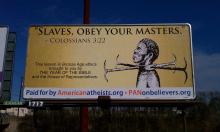
HARRISBURG, Pa. — The billboard is down, but the issue's not gone.
A billboard erected in one of the city's most racially diverse neighborhoods featured an African slave with the biblical quote, "Slaves, obey your masters." It lasted less than a day before someone tore it down.
Now, the Pennsylvania Human Relations Commission is investigating and is meeting with both the atheists who sponsored it as well as leaders of the NAACP who found it offensive and racially charged.
The atheists behind the sign said they were trying to draw attention to the state House's recent designation of 2012 as "The Year of the Bible" -- an action by lawmakers that the atheists have called offensive.
But there were concerns that erecting such a billboard is playing with fire.
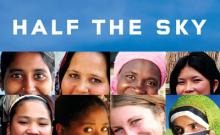
As part of International Women’s Day, take a moment and watch author Sheryl WuDunn’s TED Talk: Our Century’s Greatest Injustice.
Her best-selling book Half the Sky has touched and inspired millions across the globe, and here’s the 10 minute version.
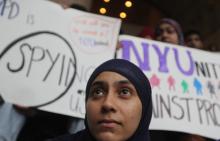
NEWARK, N.J. — As friction over the New York Police Department's spying on New Jersey Muslims continues to grow, the state's top FBI officer said the uproar is damaging his agency's ability to gather important counterterrorism intelligence.
"What we have now is (Muslim communities) ... that they're not sure they trust law enforcement in general, they're fearing being watched, they're starting to withdraw their activities," Michael Ward, director of the FBI's Newark division, said Tuesday (March 6).
"And the impact of that sinking tide of cooperation means that we don't have our finger on the pulse of what's going on in the community as well -- we're less knowledgeable, we have blind spots, and there's more risk."
In his first public comments on the deepening controversy, Ward said the FBI has spent the years after 9/11 opening lines of communication with New Jersey's Muslim communities.

JERUSALEM — Israeli postal workers outside Tel Aviv are refusing to deliver thousands of copies of the New Testament and other Hebrew-language Christian materials.
Israel media reported Tuesday (March 6) that dozens of religious and secular Jewish mail deliverers jointly informed their supervisors that disseminating the materials goes against their religious beliefs.
The workers, who deliver mail in Ramat Gan, assert that delivering the items would be tantamount to proselytizing and therefore a violation of Jewish law.
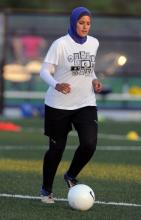
Muslim female soccer players are celebrating a decision by the International Football Association Board to allow them to test specially designed head coverings for four months.
Soccer's international governing body, known as FIFA, has prohibited headscarves since 2007, citing safety concerns. The new headscarves will be fastened with Velcro rather than pins.
The headscarf prohibition has generated controversy among fans of the world's most popular team sport, especially in Muslim countries in Africa, the Middle East and central Asia.

Against a backdrop of heartland fears that U.S. Muslims seek to impose Islamic law on American courts, a leading Muslim group will launch a campaign Monday to dispel what it called misconceptions about Shariah.
The "Defending Religious Freedom: Understanding Shariah" campaign comes at a time when more than 20 states are considering or have passed laws forbidding judges from considering Shariah in their deliberations.
Many Americans associate Shariah with the harsh punishments carried out in a few Muslim countries like Afghanistan and Saudi Arabia, even as U.S. Muslim groups insist they have no desire to introduce Islamic law on themselves or others.
"There were all these wrong notions about Shariah," said professor Zahid Bukhari, president of the Islamic Circle of North America, which is sponsoring the campaign.
The most worrisome thing, he said, was that the level of hatred toward Shariah had spread from the margins of society to the mainstream. The ICNA campaign has already drawn fire from "anti-Shariah" groups in the United State